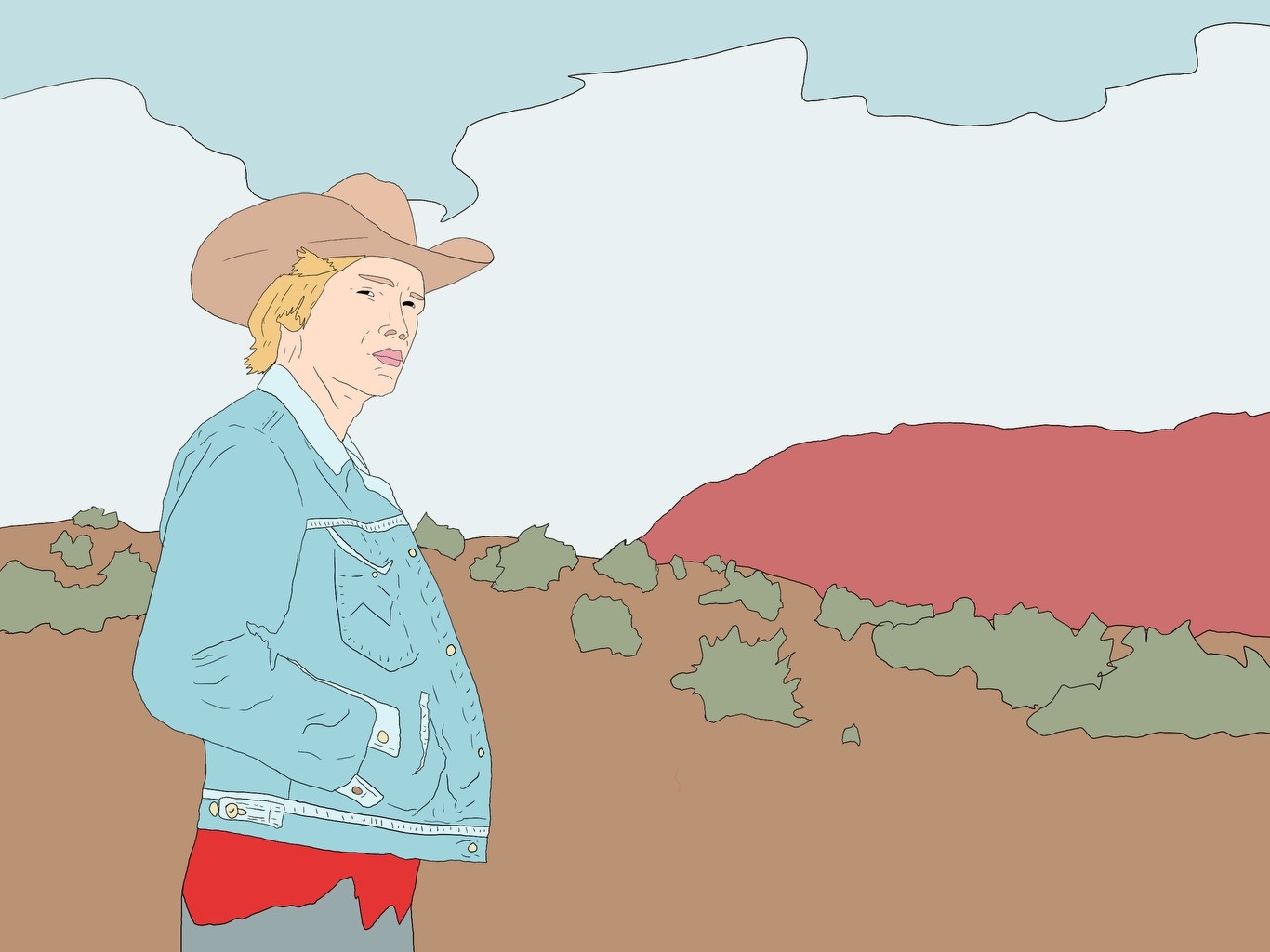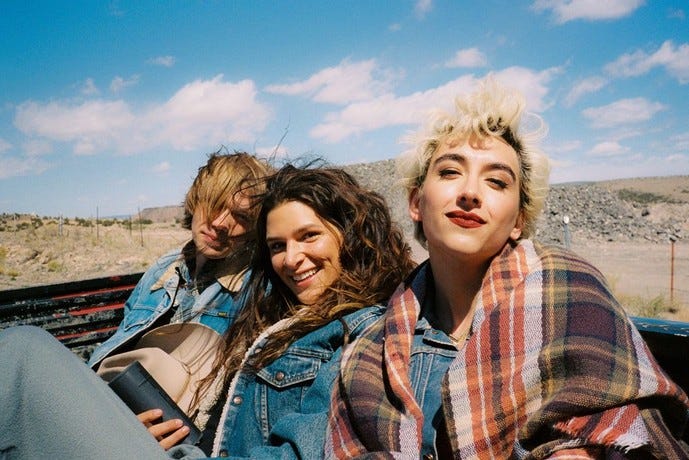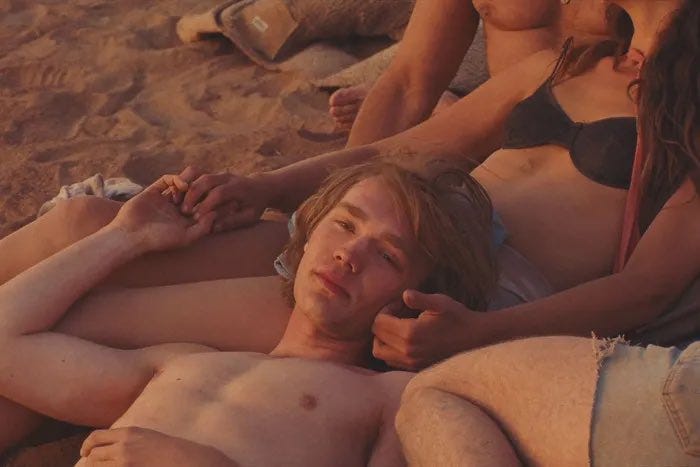Review: Yeehaw Drag
Luke Gilford’s 'National Anthem' and a reimagined frontier for Queer Westerns
The Yearning Rating: ✰✰✰
Romance: ✰✰✰
Sex: ✰✰✰✰
Storytelling: ✰✰
Performance: ✰✰✰✰
Yearning: ✰✰✰✰✰
Upgrade to paid, queen?
Light spoilers ahead.
Written by Meg Steinfeld-Heim
When I say Yee you say Haw! Or rather—that’s what I said when friend of The Yearning, TJ Soroka, sent the trailer for Luke Gilford’s debut feature National Anthem my way. Immediately, I was captivated—I mean, I’m a sucker for gorgeous visuals…and horses. He knew to bring it right to my desk as longtime TY readers will know by now that I self-identify as a recovering horse girl. As I watched the 2 ½ minute reel promo-ing this gay Western, it felt like I was watching a fantasy come to life.
Dylan (Charlie Plummer) is a young construction worker and laborer who lives in rural New Mexico with his mom and little brother. At only 21, he provides for the majority of his household, both financially and energetically—compensating as his brother’s primary caregiver and shielding him, as best he can, from his mother’s substance use issues.
When Dylan takes on some temporary labor work on a ranch a few hours out of town, he looks around wide-eyed and realizes that this space may not be the typical family ranch—yes, it's a community, but it’s different. (Spoiler: it’s super gay.) Refreshingly, National Anthem is not a story about a queer person who finds their footing after fearful resistance—instead, Dylan welcomes this brand new world with a quiet, contained sense of wonder. Charlie Plummer really does a beautiful job with Dylan— the character’s pure, gentle soul comes through so clearly during the entire film. National Anthem feels like a movie about self-discovery—a story that asks, what if all the circumstances were just right, for just long enough, that you found a safe place to question and explore something new about yourself?
Dylan meets Sky (Eve Lindley), an enchanting, free-spirited trans girl who lives on the ranch and is partnered with the ranch owner, Pepe (Rene Rosado). Quickly, the two are head-over-heels for each other, and their chemistry on screen evokes those fluttery, giddy days of new queer romance. Sky is confident, bold, and uninhibited— everything the shy, even-keeled Dylan isn’t. Even though we can all recognize the cliché there for what it is, I really appreciated that this classic opposites-attract setup doesn’t feel tired in National Anthem; it's a testament to these performances that this felt fresh and exciting.
I admired National Anthem for its fearless choice to combine the magic of the Western Americana experience with the reality of modern queer love, relationships and culture. Love, even when it's found in the breathtaking desertscape of New Mexico, can still be complicated. Through unfolding dynamics between Pepe, Dylan and Sky, Gilford acknowledges the complexity of non-monogamy and partnership and finding balance in our relationships as they grow and change over time.
I recognized Luke Gilford’s name immediately, I know him from iconic photoshoots such as this one and this one. His visual expertise behind the camera is the best part of this movie; every single frame is dreamy, hazy, and textured to perfection. Gilford builds a truly beautiful shot! The landscape of New Mexico horse country is tangible. The years of research he did on queer rodeo performers and familiarizing himself with this real-life community comes through so clearly while watching National Anthem.
On the whole, the stories and moving parts that surround Dylan’s central journey through this movie felt both sudden and a bit underdeveloped to me. You have to be ready to be forgiving of the timeline and pacing. I was taken out of the story a few times by pretty…implausible jumps in time, plot and character development. The arc of Dylan’s family, in particular, felt clunky. We meet Dylan’s mother and get the sense that she is checked out and has other priorities (predominantly, staying out late and drinking). These make it so she regularly takes advantage of Dylan’s love for his little brother, Cassidy–to the point that he is a surrogate parent. What starts out for Dylan’s mom as a believably homophobic “bad guy” character ends up moving towards resolution at an unrealistic pace. I felt slightly cheated out of seeing Dylan’s mom actually have to confront her prejudices and mistakes, which would have been healing in its own way.
Similarly, when Dylan begins bringing Cassidy along for rodeo and ranch activities, we see almost no hesitation before this very young, very sheltered kid is fully integrated into the rhythms of the ranch and participating in drag shows. Back at the ranch (sorry, I had to), I struggled a bit to reconcile the sweet, steady energy of these characters’ friendships with their very steamy, very explicit (group) sex scene. While deep friendship and sexual freedom can absolutely exist together, the way that this scene was edited made it feel distinctly separate from the rest of the movie.
None of this stops the beautiful moments in this film from coming through. Gilford deepens the already-familiar concept of found family by integrating the unique relationship between these brothers into the larger discovery of Dylan’s queerness and personal identity. This movie is unapologetically sexy and doesn’t shy away from showing desire. The writing is earnest and thoughtful; and you come away with a clear sense of the values held by those who made it. National Anthem is beautiful, vital, and joyful.











